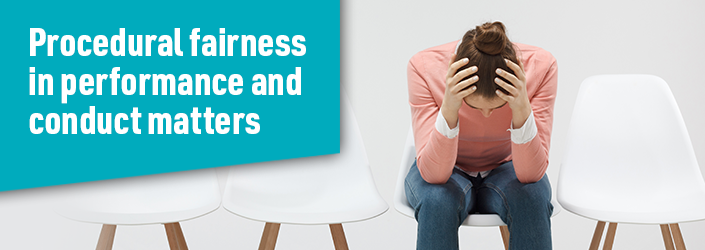Procedural fairness in performance and conduct matters

Enterprise Agreements generally include the process that a school must undertake when conducting a workplace investigation into conduct or performance. The underpinning rule is that the school must apply procedural fairness during any process.
This includes the right to have support at any meeting. Make sure that you insist on having a “representative” rather than just a “support person”. Representatives have the right to participate and advocate, whereas support persons only take notes and hold the tissues. Procedural fairness also involves having time to arrange that representation and to formulate a response.
If a decision has not been reached in a procedurally fair manner the result may be challenged through the dispute resolution or grievance clauses or through unfair dismissal or general protections proceedings. There are many precedent cases defining what ‘procedural fairness’ means. However, put simply, there are four main elements to it:
The right to know the case one has to meet: This means that you must know the case against you. In situations where limited information is given to you about allegations, the Union can write to the school to get further information about what exactly the case against you is. The information that the school intends to rely on should be put to you in an investigation. We advise our members to contact us as soon as they receive any information about a possible investigation. The sooner we are involved, the more likely the process will run fairly and smoothly.
The hearing rule: This means that you are given a reasonable opportunity to respond and put your case forward. You should be able to put your own evidence forward and any witnesses that you think should be interviewed. The Union can assist with preparation of this material and advise you about your options and how to best frame your case. The school should give you a reasonable amount of time to respond, and if they don’t the Union can write to the school on your behalf to request further time as you will need time to consider the allegation and evidence the school has put to you.
The rule against bias: This means that the employer/decision-maker must not prejudge or have a personal interest in the outcome and must be unbiased in the matter to be decided.
The ‘no evidence’ rule: This one can be an issue, because some employers will refuse to provide the investigation report or the details of how they arrived at the outcome. The no evidence rule requires that the decision ultimately must be based on logical evidence and that irrelevant considerations should not be taken into account. The decision must not be unreasonable, that is a reasonable person should be able to reach a decision based on the evidence. The Union can inquire in situations where an outcome is reached and there is a real question about the veracity of the evidence.
The Union will agitate for procedural fairness in disciplinary matters, but it is essential to contact us for advice as soon as you are aware of an impending meeting or investigation. Simply hoping things will sort out is never a good option.
Contact us for assistance on 84100122 or email enquiries@ieusa.org.au

